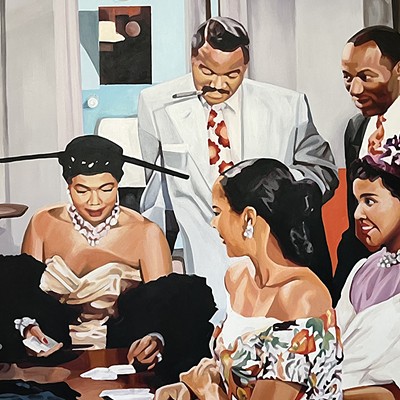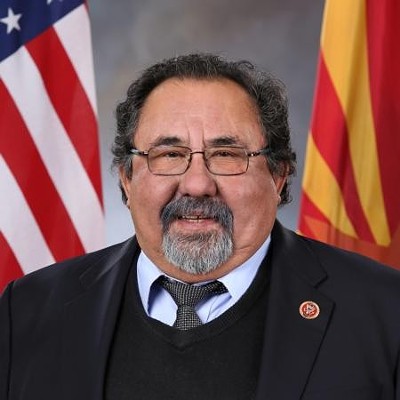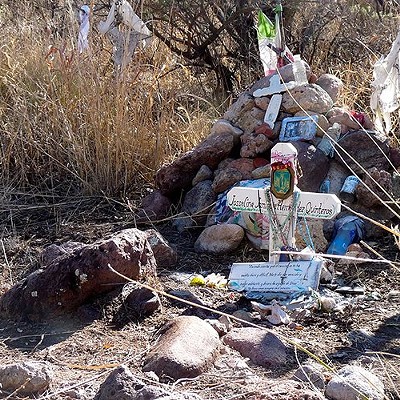But a loud banging at the door suddenly woke up both mother and son. It was 7 a.m., too early for visitors, and the insistent knocking was scary. Marlen's parents, Isabel and Martin, were asleep in their room at the opposite end of the family trailer, and her 16-year-old sister, Guadalupe, stumbled out of bed to answer the door.
Guadalupe was shocked at what she saw. Outside, just beyond the chain-link fence and her mother's garden patch, was a platoon of cars from the Department of Public Safety, the Arizona agency that runs the Highway Patrol and also conducts high-level criminal investigations. Two DPS officers were standing on the front steps. And they were demanding to speak to Marlen.
Nobody in the house had ever had trouble with the law. The family was from Cumpas, Sonora, south of Douglas, but they'd been living peacefully in Tucson for 10 years, since Marlen was 14 years old. All of them were proud that she'd graduated from Cholla High School back in 2002, and that she'd worked so hard ever since.
Since picking up her diploma, Marlen first did cleaning at a movie theater in Sahuarita and then at a Super 8 Motel in Tucson; next, she was a waitress at the House of Cheng Chinese restaurant. She started working at Panda Express in 2004, and ever since had been a counter server at the popular Chinese fast-food chain restaurant at Swan and Grant roads, slinging Beijing beef and kung pao chicken to hungry diners, and cleaning up the store during the slow hours. (A few weeks before the knock on the door, she moved to the location at Silverbell Road and Speedway Boulevard.)
She was shocked when Guadalupe hurried into her room and cried out, "The police are here for you." Startled by the commotion, Freddy started wailing, and when he was wrenched out of his mother's arms, his wails turned to screams. Guadalupe tried to soothe him by dandling him on her hip, and Marlen hurried out to the living room in her pajamas.
"I was in shock, afraid," Marlen says. "I was afraid for my child."
Speaking in a hoarse voice, she asked the agents what was going on. They told her they wanted to talk to her about her car out front, and she let them into the house. She'd bought the Ford Mustang so she could cut down on her commuting time to Panda Express--it sometimes took her two hours to get there by bus from her southwest-side home--and took out a huge loan to pay for it.
Then the officers changed the subject. What they really wanted to discuss was her job.
"We know you work at Panda Express," one officer said, as Marlen tells the tale later. "And you're using the name of Marlen Martinez. You're coming with us."
The officers arrested the young mother on charges of using someone else's name and someone else's Social Security number to work and get the car loan. The alleged crimes apparently were so serious that there was no time for her to get dressed. Officers told her they would allow her only to throw a sweater over her pajamas and to put on some shoes.
"They didn't let me eat. They didn't give me papers or read me my rights," Marlen would recall months later, sitting at the kitchen table of the trailer with her mother, Isabel, who wept at the memory. "They treated me like a dangerous person."
She asked for permission to brush her teeth. The two officers conferred with one another, discussing whether that was permissible. When they finally agreed to her request, Marlen managed to snatch a bra from her room and sneak it into the bathroom. She put the bra on under her pajama top so she could at least get to some level of modesty as she was led away in her night clothes.
Freddy was still crying, and the officers told Guadalupe to tend to him. Then they hauled Marlen outside, where a female officer frisked her and handcuffed her behind her back, in full view of neighbors who were out and about. The neighbors saw her car towed away. And then they watched as the quiet young waitress was put in the back of the police car and driven away to the sound of Freddy's screams.
By the time Marlen saw her baby again--after 112 days in the Pima County Jail, and three weeks in the for-profit immigration detention center in Eloy--Freddy had already passed his first birthday. He'd fussed for weeks after she was taken away and had trouble sleeping, but by the time his mother came back, he had no memory of her. When she tried to hold him, or even touch him, he'd hit her and cry.
He had no idea who she was.
The case of the Panda Express 11 erupted in Tucson on March 18, the day after St. Patrick's Day, a holiday that honors the tragic history of the immigrant Irish.
Marlen Moreno-Peralta was the first of 11 undocumented Panda Express workers from Mexico to be arrested and charged that day. Headlines about the case were splashed across area newspapers, raising the alarm about the crime of identity theft. Attorney General Terry Goddard noted darkly, and falsely, in a press release that all 11 were "associated with a Tucson identity-theft ring."
Marlen, two other women and eight men were indicted on a Class 3 felony charge of "aggravated taking the identity of another person." (In 2005, the law was changed to make it a felony to use a fake ID to work.) During an investigation that began in December 2007, the DPS Organized Crime Unit amassed a sea of documents on all 14 employees then working at the Panda Express on Swan and concluded that 12 were working illegally in the U.S. and using Social Security numbers that were not theirs. (The 12th worker got away and was never charged.)
"None of them had any idea it was a crime," said Isabel Garcia, Pima County legal defender and Marlen's attorney, in court in August. Immigrants, she added, use Social Security numbers only in order to get jobs and feed their families.
But that didn't keep the Panda Express 11 out of jail. They weren't accused of a violent crime, and most had local family ties, but they weren't eligible for bail before their hearings. Thanks to Proposition 100, voted into law by the people of Arizona in 2006, any defendant accused of a felony and believed to be in the country illegally can't be released on bail. As the mother of an infant child, Marlen begged to be allowed out on bond, but her request was turned down.
"These people you're getting to know are fine people, even victims of the federal government's inability to do immigration reform," Margo Cowan, assistant Pima County public defender, told the judge at the sentencing hearing in August. "They are victims of state laws that criminalize them for working."
The undocumented counter workers, cooks and cashiers were imprisoned in the Pima County Jail, alongside accused murderers, rapists and drug-dealers. But where accused violent criminals can often put up bail and go home to await trial, the restaurant staff had to sit in jail for four months.
Despite the hard jail time and the high drama of the stakeouts that led to their arrests, not one of the workers was convicted of a felony. All 11 pled guilty in July to the far lesser charge of criminal impersonation, admitting only that they were "pretending to be a lawfully employed member of the Panda Express restaurant crew."
Pima County Superior Court Judge Frank Dawley ruled the infraction a misdemeanor and sentenced most of the defendants to fees and time served. (Two still face a sentencing hearing this month.)
There was never any finding that they had stolen anyone's identity, or that they had hurt anyone in any way. Most of the Social Security numbers had never belonged to anyone else: They were made up. Only one had been issued to a real person, and she was deceased. In fact, Dawley reproached the prosecutor in August, saying, "You don't have any specific example of harm."
Even so, the incarceration odyssey of the Panda Express 11 continued after Dawley finally sprang them from jail in July. They were picked up by agents from Immigration and Customs Enforcement and taken to immigration detention centers in Eloy and Florence, where they were held for weeks. Darío Cruz-Diaz, as of this writing, is still there, the only one still being held.
So far, six have been returned to Mexico, and one, Pima Community College student Francisco Domingo Mondaca-Duarte, has agreed to go back in December. Three of the Panda Express staffers--Marlen, Roselia Araceli Torres-Ruiz and Omar Espino-Lara--are petitioning to stay. All three were brought to Tucson as children and grew up here, and all three now have children who are U.S. citizens.
Now 25, Araceli was just 7 when she came to Tucson, attending Cragin Elementary School, Roskruge School and Tucson High School.
"I consider myself part of this country," the bilingual Araceli says. "Even though I don't have papers, I've done a lot of positive things in this country."
The résumés of all the workers demonstrate that Tucson businesses big and small are dependent upon immigrant labor. Like Marlen, Araceli has worked steadily since high school. She'd been working at Panda Express for seven years when she got arrested. Before that, she was a customer-service representative at Sears in the Tucson Mall, where she deployed her excellent English and Spanish language skills. Before that, it was telemarketing, selling prepaid phone cards to Spanish-speakers, and before that, washing dishes at a restaurant.
Omar, 25, former soccer star at Sunnyside High School, first came to Tucson at the age of 9. After two years, his family went back to Guanajuato, but returned permanently when Omar was 14. He graduated in 2002 and went on to Pima to study accounting. But when his father was hurt in an accident, Omar dropped out of college so he could support the family.
First, he worked at Carl's Jr. and then went over to Panda Express, where he rapidly rose to assistant manager. A church-goer who coaches a youth-soccer team on weekends, he's a young man "Americans would be honored to have ... as a member of society," his lawyer, Maria Dávila, told the court.
"What has happened is shameful, a travesty," Cowan agreed. "These people made this community better, as immigrants to this country have been doing for 200 years."
The Panda Express 11 could have come right out of the Econ 101 textbook: They were classic low-wage workers in a service economy. For $8 to $10 an hour, they cooked and served food, and washed toilets and floors for the California-based corporation. Marlen's pay, after four years, was $8.70 an hour. In their report, the DPS detectives reported that over the course of four years at Panda Express, Marlen had been paid a total of $50,324.92.
That's an average of $12,580 a year, paid by a thriving corporation whose mission statement calls it an "organization where people are inspired to better their lives."
Some of the workers had been with Panda for years, but they--and Panda Express--eluded detection all that time. Despite its finding that 12 out of the 14 store workers were undocumented and working illegally with fraudulent Social Security numbers, DPS hastened to assure the media that Panda Express officials would not be charged with any crime.
"This didn't have anything to do with Panda Express," DPS spokesman Quentin Mehr told the Arizona Daily Star. "This is not a reflection on the Panda Express," he reiterated to the Tucson Citizen. "They are not being investigated." And Panda's corporate counsel, Monte Baier, asserted in a written statement, "Panda Express has and continues to be in full compliance with all federal and state laws."
Anne Hilby, spokeswoman for the state Attorney General's Office, notes, "We found no evidence that Panda Express was aware of the fraudulent Social Security numbers." In any case, the new employer-sanctions law would not have applied, because it went into effect on Jan. 1, 2008, before the workers were hired.
And in its enthusiasm for the law, Panda Express checked out workers at its 11 other Tucson locations and fired everyone found to be legally "ineligible for employment," says Thien Ho, manager of corporate relations.
Ironically, it was the low Panda wages that ultimately led to the investigation. Once Freddy was born, Marlen's small paycheck was stretched too thin, and she applied for benefits with the Arizona Department of Economic Security. Freddy is an American citizen, born July 20, 2007, in Tucson, and he was entitled to help.
"My child qualified for food stamps and AHCCCS (health care)," Marlen says. "The problem began when I asked for food stamps for Freddy."
Marco Liu, a DES program administrator, says U.S. citizen children of undocumented immigrants are entitled to such benefits if the family qualifies financially. Normally, staffers don't alert authorities if they encounter undocumented applicants--in fact, DES officials try to dispel that fear in the community--but "if there's an intentional program violation, we refer it up to state and legal counsel."
DES sent an investigator, Lizbeth Lucero, to the family's trailer home. Marlen believes that after that, a DES officer called the Department of Public Safety and reported her.
"When they arrested me, they told me that DES is a font of information," she says.
The DPS case file notes that its investigation was triggered by a tip from a law-enforcement source in December. Hilby, with the state Attorney General's Office, confirmed: "Our office had this referred to us with concerns of welfare fraud, that one individual applied for benefits with a Social Security number that was not hers."
By February, DPS served a subpoena on Panda Express corporate offices in Phoenix, demanding information on Marlen and all the workers at the Swan restaurant.
Panda Express wasted no time giving up its loyal workers, some of whom had worked for the company seven years or more. Joyce Martinez with the California headquarters called the DPS on Feb. 20 to say the company "wanted to assist in complying," according to the DPS report. Lyle Forcum telephoned on Feb. 22, reiterating Panda's readiness to help, and then shipped off a list of the employees' names, birthdates and Social Security numbers. A DPS check with the Social Security Administration revealed that the names did not match the numbers.
The Attorney General's Office had originally sought information only on Marlen, not on her co-workers, Hilby says.
"But if you come across evidence of other crimes, our office has the responsibility to investigate. We became aware of it, and we had to move forward with prosecution."
By March 18, DPS officials were ready to pounce.
At Grant and Swan, across town from Marlen's trailer park, the Arizona Department of Public Safety was setting the trap.
Panda Express normally opens at 10:30 a.m. for early-bird lunchers. The staff comes in around 10 to get things ready, to polish up the brown faux-marble tabletops and to start sautéing the veggies. But the day that Marlen was rousted out of bed just after dawn, most of the workers had arrived early, around 9:30. They were expecting a visitor from corporate, and they wanted to make sure the place looked as good as it could.
"We were waiting for our boss from California," Araceli says, speaking in her midtown house in August, months after she got out of jail and detention. "Everybody was cleaning."
Araceli and Omar didn't mind putting in the extra time, though both were scheduled to work their usual 12-hour shifts.
Dressed in their uniforms--little black caps and polo shirts embroidered with pandas--Araceli and the others didn't know that Panda Express had been actively cooperating with DPS for weeks. Nor did they know, as they arrived for work, that Marlen was already in custody. Or that as they stepped off the Sun Tran bus or pulled their cars into the parking lot, they were already under surveillance by the DPS agents.
Cruz-Diaz, then 55, had gotten there even earlier than everybody else. He showed up at 8 a.m. to wash the big glass windows.
"He was good at that," remembers Araceli, who worked as "lead counter," supervising the female servers who ladled out the food.
The rest of the team "went in 20 minutes early. We were joking around, laughing. I went to the bank. I came back."
Assistant store manager Omar was in a good mood. He'd just returned from a corporate-strategy session in Phoenix the day before, and he'd gotten the good news that sales were up.
Rudy Garza-Salas, 38, on the job three years, had started cooking in the open kitchen, stir-frying broccoli and sizzling strips of chicken. Rosa Nohemi Gutierrez Parra, 28, was opening up the counter. A college graduate with a degree in chemistry and a tireless volunteer at Duffy Elementary School, where her 6-year-old son, Jorge, was in kindergarten, she had been on the job just three months.
At precisely 10:30, "I opened the register, opened the store," Araceli says. "I saw what I thought was my first customer."
Araceli turned to the woman with a smile, but she was not somebody with a late-morning craving for crispy shrimp. The woman who stepped in the door was a DPS agent, the advance guard of a workplace raid. Araceli cries at the memory of what followed.
"It's the last day I saw my team," she says, wiping away tears. "We were happy. I liked that job."
Two agents told Dario, the window washer, to come inside. They followed him into the store, and one turned and locked the door.
"I told Omar, 'These are police,'" Araceli says. "I got nervous. I had a bad feeling. I called my mother."
She starts crying again, remembering her mounting fear. "I told her to take care of my daughter," 3-year-old Giselle. "I said, 'I don't know what's happening, but I love you guys.' I called my husband and told him there were police all over the store. The back door was closed. Something was going on. It was not looking good.
"I told him I loved him, and to take care of the baby. I said, 'I think it's immigration.'"
Unbeknownst to the five workers, DPS agents were circling around outside, with two guarding a side door. (In all, 18 DPS agents participated.) Inside, officers presented Omar with a search warrant and ordered everybody to sit at the customer tables, underneath the cheerful posters with drawings of pandas in every possible pose. Just then, Juan Trujillo, then 21, turned up, hurrying into the restaurant a little late and oblivious to what was going on.
"What's up?" he asked his work buddies, puzzled to find them all sitting instead of standing.
Now with six suspects on hand, the agents separated the workers into small groups. Araceli and Darío were put together and read their Miranda rights. The officer intoned the familiar words--"You have the right to remain silent ..."--but then kept on asking questions, she says.
One asked, "Are you legal or illegal?" Araceli is a feisty character, used to managing the line, and she replied, "I have a right to keep silent. I don't want to answer." Then, she remembers, "He got really mad. He took his badge and said, 'You're being arrested for ID theft. I'm going to ask you one more time: Are you legal or illegal?'"
When Araceli again refused to answer, the man replied, "There's only one answer." A woman cuffed her and, according to Araceli, pulled hard on her hands and berated her behavior, saying, "She doesn't want to cooperate with us." The man agreed. "She doesn't want to answer me."
Araceli finally succumbed to the pressure. "All these people were around me. I said, 'I'm illegal.'"
By 1 p.m., all six of the workers had been taken away to face a dizzying array of interrogations in facilities all over town, including the Border Patrol headquarters on South Swan Road, the DPS center on South Tucson Boulevard, and the Pima County Jail. The corporate visitors Araceli and the others had been expecting turned up in time to see their workers being led away in handcuffs. By 1 p.m., according to the DPS report, the "restaurant was turned over to" to Apichai Vitayaprachasakul, Alan Huang and Ricky Tong of Panda Express.
DPS rounded up the other five staffers at their homes, including Norberto Hernandez Ochoa, a 34-year-old father of three, married to an American citizen; Francisco Domingo Mondaca Duarte, a 22-year-old Pima College student hoping to become a computer engineer; Artemio Marin Bustamante, 23, who had a pregnant wife and a toddler at home in Mexico; and Jose Guadalupe Pichardo Rivera, 20.
Late in the day, the Panda Express 11 were reunited, tearfully, at the Pima County Jail, six of them still in their work shirts and Marlen still in her pajamas. They would soon trade these clothes in for the jail uniform: orange jumpsuits.
"We were with all these people who were really, really criminal," Araceli says. "We couldn't realize we were going into jail. I started to cry. That's the last day I saw my daughter."
One summer day a few weeks after she was released from the immigration detention center, Marlen Moreno-Peralta bustles around her immaculate kitchen, loading up a plate with cookies. She's delighted to be at home again. Tucson immigration activists raised the money to pay the bond to get her out of detention, and she's awaiting word on her petition to stay in the United States. She never did get her car back.
Marlen is a big, soft-spoken young woman with a cascade of light brown curls. She smiles easily, even though her son, Freddycito, as she calls him, is staring at her warily from the safety of his grandmother's arms.
"It's very unjust what they did to us," she says, looking over at him. He's still refusing to come to her. "They took us away from our children, separated us from our families. I will never forget. It was only for working. They treated it as a crime."
Marlen was humiliated to be imprisoned with people accused of serious offenses. At the Pima County Jail, she was with "drug dealers, DUI people," she says. "Three women were accused of murder." She was afraid, too. "The places are always dangerous. The women fought."
The detention center in Eloy, run by the for-profit Corrections Corporation of America, was "very dirty. There was no privacy in the bathroom. There was a lot of contraband, people smoking drugs, very different from the people in my regular life."
It was painful for Omar, too, who in his regular life is a pillar of Iglesia de Dios, the Church of God, on the southside. An athlete all his life, he suffered by being locked into a small space. He was allowed outside only "one hour a week, on the basketball court."
He struggled to keep up his spirits. "I didn't eat at all for the first six days. I didn't take a shower for 10 days. The place was dirty. ... I didn't want to live anymore. I spoke to no one."
The detention center in Eloy was "not better." The place was infested with gangs, he says, and he had to fend off their demands that he join.
Araceli still trembles when she talks about her jail time. Some of the officers were kind, she remembers, and sympathized with the plight of the Panda prisoners. But others were harsh; one officer would scold her for speaking Spanish. A fellow inmate taunted her that she'd be deported, but Araceli says she answered back, "I have done more positive things for the country than you. I love this country. I'm here because I was working. You're here for stealing. I'm proud of myself and did a lot of good things."
Worst of all was the separation from their children. At the Pima County Jail, only visitors with legal documents can visit, and then they see their loved one not in the flesh, but via a video feed. Omar and his wife, Perla, a legal resident, have a 2-year-old son, Gianlucca, named for an Italian soccer player, and he is stepfather to her three older children from a previous marriage. Gianlucca would come to the jail with his mom, but he was confused.
"What are you doing there?" he would ask, peering at his dad on the computer screen. "When are you coming out of the office?" The other kids would pester their mother about their stepdad's absence, demanding, "When is he coming back from work?"
No one could bring Marlen's Freddy in, and Araceli didn't want her 3-year-old daughter, Giselle, to see her in jail. Unlike Freddy, Giselle was big enough to remember her mom during the long absence, but old enough to be mad that she was gone.
"Where are you, Mommy?" she'd ask her on the phone. "When are you coming home?" Sometimes, though, "She was too angry to talk to me. She'd run and cry." Worst of all, for both mother and daughter, Giselle got sick when her mom was locked up. Araceli was distraught that she couldn't care for her.
Among them, the Panda Express prisoners had 12 young children, most of them U.S. citizens. In June, the three mothers in the group--Marlen, Araceli and Nohemi--wrote a plaintive letter to the public from inside the prison walls.
Under the law, they wrote in Spanish, "Working has been transformed into a crime. Because of this law, we remain here, far from our families and children. The children are the most affected because they are suffering the absence of their mothers and fathers, who one day went out to work and never came back."














